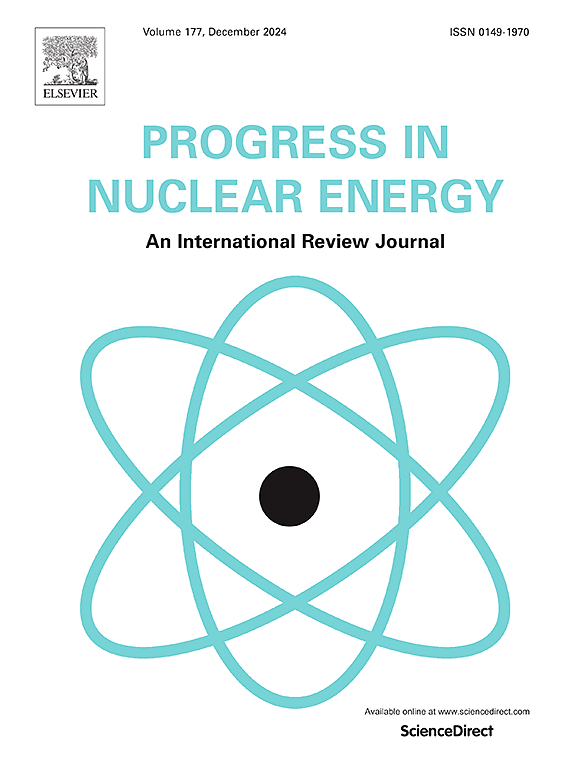An intelligent active fault tolerant control strategy for pressurized water reactor: Addressing sensor faults
IF 3.2
3区 工程技术
Q1 NUCLEAR SCIENCE & TECHNOLOGY
引用次数: 0
Abstract
Robust and reliable control strategies are essential for ensuring the safe and efficient operation of thermal energy systems, particularly in nuclear reactors. This paper proposes an intelligent active fault-tolerant control strategy to address sensor faults in pressurized water reactors. The proposed framework comprises three key components: a control mechanism, a fault detection and diagnosis unit, and a reconfiguration mechanism. A Proportional-Integral-Derivative controller, optimized using ant colony optimization, is implemented to regulate neutron density. The fault detection and diagnosis unit employ a recurrent neural network estimator to detect sensor faults by analyzing residuals. Upon fault detection, a reconfiguration module, which is also based on a recurrent neural network, predicts the true value of the faulty sensor using correlated measurements from other sensors. The prediction accuracy is quantified using the mean square error performance index. The effectiveness and practical applicability of the proposed strategy are demonstrated through simulation studies, including a representative drift fault scenario.
基于传感器故障的压水堆智能主动容错控制策略
鲁棒可靠的控制策略对于确保热能系统,特别是核反应堆的安全高效运行至关重要。针对压水堆传感器故障,提出了一种智能主动容错控制策略。该框架由三个关键部分组成:控制机制、故障检测与诊断单元和重构机制。采用蚁群优化的比例-积分-导数控制器实现了中子密度的调节。故障检测与诊断单元采用递归神经网络估计器,通过残差分析检测传感器故障。在故障检测后,重构模块也基于递归神经网络,利用其他传感器的相关测量值预测故障传感器的真实值。采用均方误差性能指标量化预测精度。通过一个具有代表性的漂移故障场景的仿真研究,验证了该策略的有效性和实用性。
本文章由计算机程序翻译,如有差异,请以英文原文为准。
求助全文
约1分钟内获得全文
求助全文
来源期刊

Progress in Nuclear Energy
工程技术-核科学技术
CiteScore
5.30
自引率
14.80%
发文量
331
审稿时长
3.5 months
期刊介绍:
Progress in Nuclear Energy is an international review journal covering all aspects of nuclear science and engineering. In keeping with the maturity of nuclear power, articles on safety, siting and environmental problems are encouraged, as are those associated with economics and fuel management. However, basic physics and engineering will remain an important aspect of the editorial policy. Articles published are either of a review nature or present new material in more depth. They are aimed at researchers and technically-oriented managers working in the nuclear energy field.
Please note the following:
1) PNE seeks high quality research papers which are medium to long in length. Short research papers should be submitted to the journal Annals in Nuclear Energy.
2) PNE reserves the right to reject papers which are based solely on routine application of computer codes used to produce reactor designs or explain existing reactor phenomena. Such papers, although worthy, are best left as laboratory reports whereas Progress in Nuclear Energy seeks papers of originality, which are archival in nature, in the fields of mathematical and experimental nuclear technology, including fission, fusion (blanket physics, radiation damage), safety, materials aspects, economics, etc.
3) Review papers, which may occasionally be invited, are particularly sought by the journal in these fields.
 求助内容:
求助内容: 应助结果提醒方式:
应助结果提醒方式:


